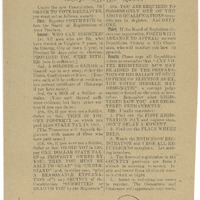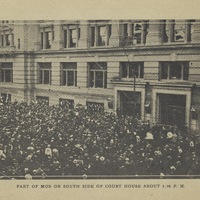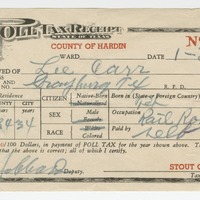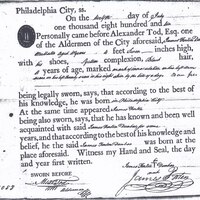 New Jersey Franchise Statute (1797) New Jersey Franchise Statute (1797) |
|
This New Jersey statute explicitly added women to their voting laws, while also allowing free people of color to vote. When New Jersey rewrote its constitution in 1844, it explicitly denied women and African Americans the right to vote.
|
 Notice to Republican Voters of the 9th Congressional District of Virginia (1902) Notice to Republican Voters of the 9th Congressional District of Virginia (1902) |
|
This broadside publicized information about new voting laws and poll taxes in Virginia.
|
 Of Colored Persons (1871) Of Colored Persons (1871) |
|
This act passed by the Virginia General Assembly reflects the race-neutral language of the legal code after the Civil War. Application of these statutes resulted in entrenched Jim Crow segregation.
|
 Of Masters and Apprentices (1887) Of Masters and Apprentices (1887) |
|
Acts passed by the Virginia General Assembly reflected race-neutral language of the legal code after the Civil War. Application of these statutes resulted in entrenched Jim Crow segregation.
|
 Oklahoma's Poor Rich Indians: An Orgy of Graft and Exploitation of the Five Civilized Tribes, Legalized Robbery (1924) Oklahoma's Poor Rich Indians: An Orgy of Graft and Exploitation of the Five Civilized Tribes, Legalized Robbery (1924) |
|
The introduction of Zitkala-Ša's groundbreaking report opened the scene on fraud facilitated by guardians, lawmakers, and county clerks at the expense of minors, heirs, and incompetents during early Oklahoma statehood, and focused on probate courts as a site of legal exploitation.
|
 Omaha Grapples with its Ugly Past (2019) Omaha Grapples with its Ugly Past (2019) |
|
This article looks at the legacy of the lynching of Will Brown, featuring interviews with prominent, Black Omaha community members Preston Love and Ernie Chambers, as well as University of Nebraska-Omaha Urban studies professor, Barbara Hewins-Maroney.
|
 Omaha's Riot in Story & Pictures (1919) Omaha's Riot in Story & Pictures (1919) |
|
This series of photographs document the race riot in Omaha that culminated in the lynching of Will Brown in front of the Douglas County Courthouse. In the first, as many as 20,000 people gather outside an already damaged courthouse. In the second, white rioters smile around the remains of the police car they had set ablaze. And in the third, federal troops guard the intersection of 24th and Lake streets, an area with a large number of Black homes and businesses.
|
 Opinion of Chief Justice Hornblower on the Fugitive Slave Law (1836) Opinion of Chief Justice Hornblower on the Fugitive Slave Law (1836) |
|
Justice Hornblower’s opinion in the State v. Sheriff of Burlington County called into question the authority of the Fugitive Slave Act. The opinion calls into question discrepancies between the federal law and state statute. This opinion is over the case of the Helmsley family. Alexander Helmsley and his wife, Nancy, were a free black couple living in New Jersey. Someone accused them of being fugitive slaves. Under the Fugitive Slave Act, the family should have been sent back to their former enslaver; however, New Jersey’s Personal Liberty Law protected them from being extradited from the state. Hornblower’s opinion advocated for following the state personal liberty law over following the federal law.
|
 Paul Jones v. George W. Jones (1840) Paul Jones v. George W. Jones (1840) |
|
Paul Jones initiated a suit in a Wisconsin Territory court against George W. Jones for several sums of money owed to him for labor, goods, wares, and merchandise. George argued that Paul was purchased as a slave for life from French inhabitants who were entitled to hold slaves according to the Northwest Ordinance of 1787.
|
 Perez v. Sharp (1948) Perez v. Sharp (1948) |
|
In this case, a 4-3 majority of the Supreme Court of California ruled that the state's ban on interracial marriage violated the 14th Amendment. It was the first of any state to strike down an anti-miscegenation law in the U.S, preceding Loving v. Virginia by almost 20 years.
|
 Peter and others v. Susanna Elliott and Rachell Elliott (1787) Peter and others v. Susanna Elliott and Rachell Elliott (1787) |
|
This freedom suit was brought forth by 22 enslaved people who were freed by a deed of manumission that was then contested by the executrixes of the former enslaver upon his death. The court found in favor of the re-enslavement of Peter and the other 21 freedmen.
|
 Plessy v. Ferguson (1896) Plessy v. Ferguson (1896) |
|
In Plessy v. Ferguson, the Supreme Court found that racial discrimination did not violate constitutional equal protection. This case established the principle of "separate but equal" which was overturned in 1965 by the decision in Brown v. Board of Education.
|
 Poll Tax Receipt for Lee Carr (1955) Poll Tax Receipt for Lee Carr (1955) |
|
An image of a poll tax receipt from Texas. Poll taxes were a tool to prevent Black people and poor people from voting, since the poll tax was often a significant percentage of someone's weekly income.
|
 President Johnson's Commencement Address at Howard University: "To Fulfill These Rights" (1965) President Johnson's Commencement Address at Howard University: "To Fulfill These Rights" (1965) |
|
In this speech given to Howard University's 1965 graduating class, President Lyndon B. Johnson talks about the Civil Rights and Voting Rights Acts being passed as a result of the Civil Rights Movement and the long-lasting impacts of systemic racism.
|
 Prigg v. Pennsylvania (1842) Prigg v. Pennsylvania (1842) |
|
The case of Prigg v. Pennsylvania evaluated the legality of Pennsylvania's personal liberty laws. Margaret Morgan moved from Maryland to Pennsylvania after being granted her freedom. When relatives of her previous enslaver wanted to reclaim her, they sent Edward Prigg to Pennsylvania to find her. Pennsylvania courts found Prigg guilty of violating the state's personal liberty laws, but the Supreme Court ruled that the federal fugitive slave laws overrule state laws.
|
 Queen Anne's Speech in Parliament (1712) Queen Anne's Speech in Parliament (1712) |
|
In a speech by Queen Anne before Parliament, she described a contract granted to England by Spain for slave trading rights and emphasized peace with France, as England received the contract from Spain.
|
 Re: DEI Programs Are Lawful Under Federal Civil Rights Laws and Supreme Court Precedent (2025) Re: DEI Programs Are Lawful Under Federal Civil Rights Laws and Supreme Court Precedent (2025) |
|
This memorandum from law professors across the United States explains how diversity, equity, and inclusion initiatives are legally defensible, in spite of the January 21, 2025, Executive Order titled "Ending Illegal Discrimination and Restoring Merit-Based Opportunity."
|
 Regulated Slave Trade Act (1788) Regulated Slave Trade Act (1788) |
|
This act, also known as Dolben's Act, placed limits and regulations on the slave trade, and illustrates the attempts to regulate the numbers of children in the slave trade.
|
 Remembering a dark past, renewing resolve for the future (2019) Remembering a dark past, renewing resolve for the future (2019) |
|
This article from the Omaha World Herald describes Omaha's official observance of the 100-year anniversary of the lynching of Will Brown. Omaha Mayor, Jean Stothert, spoke at the commemoration calling Will Brown's lynching one of the darkest days in our history.
|
| Rights of Black Men (1791) |
|
This commentary was written by Connecticut anti-slavery advocate Abraham Bishop in support of the Haitian Revolution. Bishop's work was printed in the Boston newspaper, The Argus.
|
 Seamen's Protection Certificate for James Forten Dunbar (1810) Seamen's Protection Certificate for James Forten Dunbar (1810) |
|
Seamen's Protection Certificates were documents authorized by an act of Congress in 1796 to protect U.S. sailors from being impressed into the service of foreign navies. For Black Americans, they also served as a way to document their free status. This certificate was issued for James Forten Dunbar, a free man of mixed ancestry who spent a long career at sea as a sailor and sail-maker aboard merchant and naval vessels, including service in the U.S. Navy during the Civil War.
|
 Selective Service Act (1917) Selective Service Act (1917) |
|
This act authorized the U.S. government to raise a national army through compulsory enlistment via a draft. The military was segregated at the time of World War I, and Black soldiers were mostly relegated to labor roles.
|
 Selective Training and Service Act (1940) Selective Training and Service Act (1940) |
|
This act authorized the U.S. government to raise a national army through compulsory enlistment via a draft. While the act prohibited discrimination based on race, the military was still segregated at the time of World War II, and Black soldiers were mostly relegated to labor roles.
|
 Seminole Agreement (1900) Seminole Agreement (1900) |
|
This congressional act ratified an agreement with the Seminole Nation concerning allotment, like enrollment and laws of descent. The second proviso established matrilineal descent of lands, money, and property for heirs.
|
 Separate schools for white and colored (1904) Separate schools for white and colored (1904) |
|
Acts passed by the Virginia General Assembly reflected race-neutral language of the legal code after the Civil War. Application of these statutes resulted in entrenched Jim Crow segregation.
|
 New Jersey Franchise Statute (1797)
New Jersey Franchise Statute (1797) Notice to Republican Voters of the 9th Congressional District of Virginia (1902)
Notice to Republican Voters of the 9th Congressional District of Virginia (1902) Of Colored Persons (1871)
Of Colored Persons (1871) Of Masters and Apprentices (1887)
Of Masters and Apprentices (1887) Oklahoma's Poor Rich Indians: An Orgy of Graft and Exploitation of the Five Civilized Tribes, Legalized Robbery (1924)
Oklahoma's Poor Rich Indians: An Orgy of Graft and Exploitation of the Five Civilized Tribes, Legalized Robbery (1924) Omaha Grapples with its Ugly Past (2019)
Omaha Grapples with its Ugly Past (2019) Omaha's Riot in Story & Pictures (1919)
Omaha's Riot in Story & Pictures (1919) Opinion of Chief Justice Hornblower on the Fugitive Slave Law (1836)
Opinion of Chief Justice Hornblower on the Fugitive Slave Law (1836) Paul Jones v. George W. Jones (1840)
Paul Jones v. George W. Jones (1840) Perez v. Sharp (1948)
Perez v. Sharp (1948) Peter and others v. Susanna Elliott and Rachell Elliott (1787)
Peter and others v. Susanna Elliott and Rachell Elliott (1787) Plessy v. Ferguson (1896)
Plessy v. Ferguson (1896) Poll Tax Receipt for Lee Carr (1955)
Poll Tax Receipt for Lee Carr (1955) President Johnson's Commencement Address at Howard University: "To Fulfill These Rights" (1965)
President Johnson's Commencement Address at Howard University: "To Fulfill These Rights" (1965) Prigg v. Pennsylvania (1842)
Prigg v. Pennsylvania (1842) Queen Anne's Speech in Parliament (1712)
Queen Anne's Speech in Parliament (1712) Re: DEI Programs Are Lawful Under Federal Civil Rights Laws and Supreme Court Precedent (2025)
Re: DEI Programs Are Lawful Under Federal Civil Rights Laws and Supreme Court Precedent (2025) Regulated Slave Trade Act (1788)
Regulated Slave Trade Act (1788) Remembering a dark past, renewing resolve for the future (2019)
Remembering a dark past, renewing resolve for the future (2019) Seamen's Protection Certificate for James Forten Dunbar (1810)
Seamen's Protection Certificate for James Forten Dunbar (1810) Selective Service Act (1917)
Selective Service Act (1917) Selective Training and Service Act (1940)
Selective Training and Service Act (1940) Seminole Agreement (1900)
Seminole Agreement (1900) Separate schools for white and colored (1904)
Separate schools for white and colored (1904)